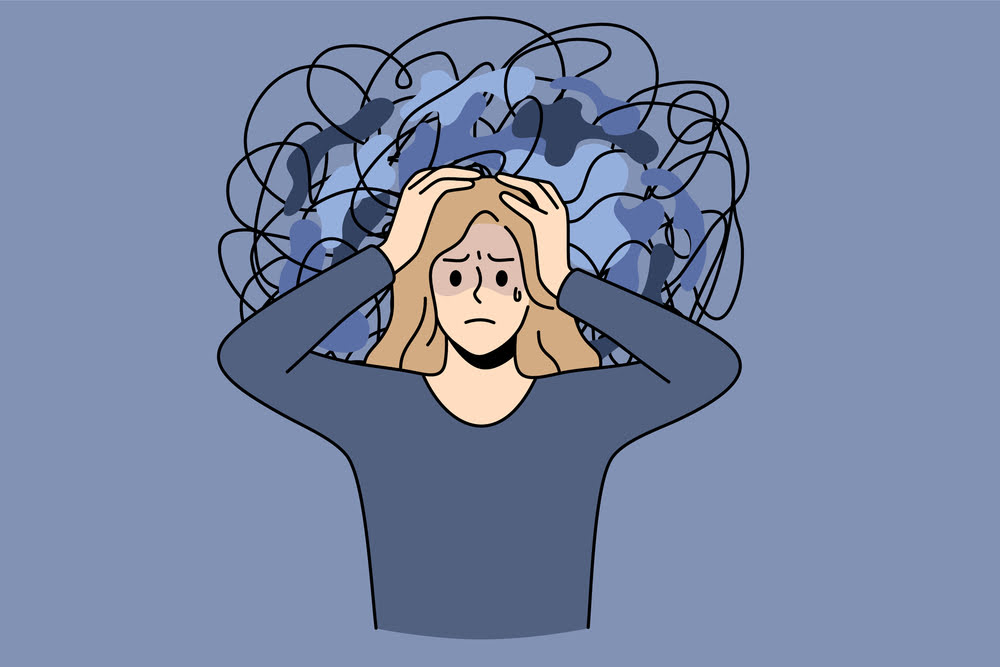Key Differences
| Aspect | Overstimulated | Overwhelmed |
|---|---|---|
| Definition | A sensory overload where the brain receives more sensory input than it can process | An emotional and mental state in which problems or demands exceed one’s ability to cope |
| Nature | Sensory experience | Emotional/Cognitive experience |
| Triggers | Loud noises, bright lights, strong smells, textures, screen time, crowded spaces | Too many responsibilities, time pressure, emotional conflict, major life changes |
| Scope | Narrower — related to sensory processing | Broader — includes emotional, mental, situational, and social overload |
| Causes | Excessive sensory input across one or more senses | Juggling multiple roles, unrealistic expectations, stress, sudden events |
| Example situations | Concerts, malls, flashing lights, digital devices, sensory-rich environments | Work deadlines, caregiving, financial pressure, relationship conflict, decision fatigue |
| Cognitive symptoms | Trouble focusing, distracted, reactive | Mental fatigue, indecision, forgetfulness, intrusive thoughts |
| Behavioral reactions | Fidgeting, escape-seeking, shielding eyes/ears, irritability, shutting down sensory-wise | Procrastination, crying, emotional outbursts, social withdrawal, freezing |
| Emotional expression | Often reactive or avoidant due to sensory discomfort | Often emotional and reflective (crying, venting, or shutting down from stress) |
| Urge/Impulse | Strong desire to escape, withdraw, or remove the sensory trigger | Strong desire for relief, support, control, or solutions |
| Duration | Often short-term and environment-dependent (can resolve after removing stimulus) | Can persist long-term, especially if underlying causes remain unaddressed |
| Awareness level | May not be fully aware until overwhelmed by symptoms | Often consciously aware of feeling overwhelmed |
| Recovery needs | Quiet, solitude, darkness, reduced sensory input, physical decompression | Rest, clarity, emotional support, stress reduction, prioritization |
| Common populations | More common in autistic individuals, those with ADHD, sensory processing disorder, PTSD, anxiety disorders | Common in everyone under stress, especially caregivers, students, professionals, trauma survivors |
| Common self-talk | “It’s too loud/bright/smelly,” “I need to get out,” “I can’t think in here” | “I can’t do this,” “There’s too much,” “I’m falling behind,” “I don’t know where to start” |
| Causal relationship | Can lead to being emotionally overwhelmed if persistent or intense | Does not require sensory overload but may include it as a compounding factor |
Overstimulation
Overstimulation, also known as sensory overload, occurs when the sensory system receives too much information from the environment. Here, the sheer quantity of information matters more than its intensity. More often than not, overstimulation occurs when your sensory system receives low-to-moderate intensity information from multiple sources. However, a single source of sensory information, if it’s too intense, can also cause overstimulation.
A good example of this is what are called supernormal stimuli. These are stimuli in the environment we’re wired to respond to, but exaggerated in some way. For example, adding sugar to foods is a supernormal stimulus for our taste buds. We’re wired to like sweet foods. Increasing the sweetness of foods makes them overstimulating. It can cause us to crave sweeter and sweeter foods as our sensitivity to naturally occurring sweet foods declines.1Korthouwer, A., Noordberg, D., & Treur, J. (2021). Desensitization Due to Overstimulation: A Second-Order Adaptive Network Model. In Computational Science–ICCS 2021: 21st International Conference, Krakow, Poland, June 16–18, 2021, Proceedings, Part II 21 (pp. 238-249). Springer International Publishing.
Overwhelm
Overwhelm is cognitive or emotional overload. Our minds can only hold a certain amount of cognitive and/or emotional information at any given time. Often, complex life problems consume all our bandwidth and overwhelm us. Other times, we experience emotions, typically related to our problems, that occupy our bandwidth and overwhelm us. For instance, anxiety and depression can be very overwhelming emotions.
Note that in case of overwhelm, the intensity of information matters more than quantity. You could feel overwhelmed just by experiencing a single emotion like depression. You’re overwhelmed but not overstimulated when that happens.
You can be overstimulated and overwhelmed at the same time. Other times, you may experience just one of those mental states.
Both lead to stress
Stress occurs when the challenges we face exceed our ability to deal with them. Often, this means having too many things competing for our attention (overstimulation) or having critical life problems on our mental plate (overwhelm). At any rate, overstimulation is not a good mental place to be in. It can significantly decrease the quality of your life.2Pérez-Chacón, M., Borda-Mas, M., Rivera, F., Chacón, A., & Avargues-Navarro, M. L. (2024). Analysis of the moderator effect of overstimulation on the relationships between indicators of health-related quality of life, extraversion and maladaptive coping strategies in people with sensory processing sensitivity. Current Psychology, 43(36), 29143-29153.
Yet, modern environments are loaded with sources of overstimulation and supernormal stimuli. It’s no wonder, then, that industrialization correlates with physical and mental health problems. The more modern a society, the more mental health problems its members have to deal with.3Montgomery, J. (2018). Evolutionary mismatch, emotional homeostasis, and “emotional addiction”: A unifying model of psychological dysfunction. Evolutionary Psychological Science, 4(4), 428-442.

